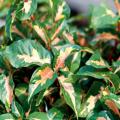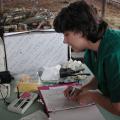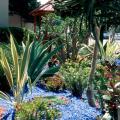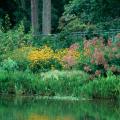News From 2004
MISSISSIPPI STATE -- Serious gardeners or those who just like to look at pretty plants and flowers will enjoy the Sept. 25 North Mississippi Garden Expo at the North Mississippi Research and Extension Center in Verona.
The expo is free and open to the public. Tours and other activities begin at 9 a.m. and continue until 1 p.m.
MISSISSIPPI STATE -- Sometimes good research just backs up what farmers already suspected.
Nine years of research at Mississippi State University's Delta Research and Extension Center in Stoneville revealed that using the tillage practice known as subsoiling in combination with irrigation does not improve cotton yields enough to cover the expense of these practices.
By Norman Winter
MSU Horticulturist
Central Mississippi Research & Extension Center
Just when we are getting comfortable with a few new plants, an excellent and versatile plant called Graptophyllum comes along and demands we learn its name.
Botanically speaking, it is known as Graptophyllum pictum and is in the family of Acanthaceae. This means the Graptophyllum is related to the Mexican petunia and Shrimp Plant, but don't go looking for any similarities. It originates in the South Pacific.
MISSISSIPPI STATE -- Take 4 inches of muck in a corral and mix in lots of humidity, a light drizzle and 50 unhappy cows. Add two scientists, two cowboys with their horses, a cow dog and a couple of pieces of high-tech equipment.
MISSISSIPPI STATE -- The cruel irony of the beautiful fall-like weather Mississippians have enjoyed in August is that it's hurting the state's cotton crop.
Cotton needs warm weather, measured as at least 2,150 accumulated heat units, to mature. Tom Barber, Mississippi State University Extension Service cotton specialist, said cotton typically accumulates 20 heat units a day in August. By mid-August this year at Stoneville, cotton had not accumulated 20 heat units in any one day, with most days coming in at six to 11 units.
By Norman Winter
MSU Horticulturist
Central Mississippi Research & Extension Center
I don't know if it has happened before in my lifetime. If it has, I don't remember, and I am sure it never happened during my brief football career. I am talking about the weather.
I have always been a proponent of planting some flowers in August, but with the recent weather, it should be a no-brainer. The weather, coupled with fresh crops of zinnias, marigolds and others arriving at your garden center, is making it fun to get back out in the yard and do a little digging.
MISSISSIPPI STATE -- At-risk mothers, children and families will benefit from a joint effort by two Mississippi agencies to deliver educational materials to improve the well-being of individuals, families and communities.
MISSISSIPPI STATE -- Bats have a mystique about them, but wildlife experts say the flying mammals do not threaten humans and are one of mosquitoes' worst enemies.
There are about 27 species of bats in North America, and eight of these are found in Mississippi. Bats here typically have brown fur, but some have red or gray coloring. Those species found locally are small, ranging in length from 3 to 5 inches with a wingspan of 8 to 12 inches. Bats have teeth and leather-like wings and tails.
MISSISSIPPI STATE -- Humans are the obvious victims of natural and manmade disasters, but animals are the primary concern for veterinary specialists.
Veterinarians are needed to respond to floods, hurricanes, fires, transportation accidents and other disasters that often involve animals. Veterinarians also are trained in issues such as food safety, diseases that can pass between humans and animals, and environmental health concerns such as waste and carcass disposal that also affect public health.
MISSISSIPPI STATE -- Strong nationwide housing starts are helping the timber markets buck late summer traditions and remain strong heading into the fall months.
Bob Daniels, forestry specialist with the Mississippi State University Extension Service, said prices normally are lowest during the driest months when timber is most accessible for harvest.
MISSISSIPPI STATE -- While students enjoyed their summer vacation, many of their teachers themselves became students.
That was the case with eight high school agriculture teachers who trained at the new Agricultural and Environmental Science and Technology Laboratory on the Mississippi State University campus.
MISSISSIPPI STATE -- Mississippi State University researchers are seeking a balance between health concerns and effective pesticide use in a state where many residents depend on agriculture and often co-exist in areas where chemical use is common.
By Norman Winter
MSU Horticulturist
Central Mississippi Research & Extension Center
Last night I was planting some new Dreamland zinnias for late summer and fall, and finished the job with the new red-dyed mulch. Even though the zinnias weren't blooming, the contrast of the red mulch and the green leaves sure looked impressive.
MISSISSIPPI STATE -- The health and safety of the state, especially the agricultural sector in the Delta, is the primary focus of the newly formed Agromedicine Program.
The Agromedicine Program is a collaboration between the Mississippi State University Extension Service and the University of Mississippi Medical Center, and is designed to help prevent agricultural-related illness and injury in rural areas. The program is funded through the Delta Health Alliance, and the primary focus area is the Mississippi Delta.
MISSISSIPPI STATE -- Market prices for catfish are up slightly from the record lows of recent years, but increased production costs are preventing growers from any major celebrations.
Jimmy Avery, Extension professor at the Thad Cochran National Warmwater Aquaculture Center in Stoneville, said this year's prices should average 8 to 10 cents more than in 2003 when prices averaged 58 cents per pound. Fuel, feed and other production expenses are adding 8 to 9 cents per pound to growers' production costs.
MISSISSIPPI STATE -- Horse enthusiasts will find a lot to like at the Sept. 25 Fall Horse Sale at the Mississippi Horse Park, AgriCenter and Fairgrounds.
Sale-day activities begin at 9:30 a.m. with an equine nutrition program, followed by a lunch sponsored by Cargill Animal Nutrition. The sale begins at 1 p.m. and features almost 50 horses from the Mississippi Agricultural and Forestry Experiment Station research herd.
MISSISSIPPI STATE -- Entrepreneurs who dream of creating and manufacturing food products can learn how to make those dreams reality at a day-long workshop offered in Southwest Mississippi in September.
MISSISSIPPI STATE -- Spraying chemicals is a significant part of the cost and control of modern farming, and calibrating the implements can make a difference in efficiency.
Herb Willcutt, agricultural engineer with the Mississippi State University Extension Service, said calibration is a simple procedure that can potentially save thousands of dollars and protect the environment.
By Norman Winter
MSU Horticulturist
Central Mississippi Research & Extension Center
A reporter once asked me, "If you could convince all garden centers to sell one perennial, what would it be?" The answer was simple for me: the Joe Pye weed.
MISSISSIPPI STATE -- An Extension program trying to identify future medical leaders in Mississippi is succeeding at its goal.
Rural Medical Scholars is a five-week summer program offered by the Mississippi State University Extension Service in cooperation with the state's 15 community and junior colleges through the Mississippi Rural Health Corps. It recruits students entering their senior year of high school, offering them a brief college experience and a taste of life as a medical doctor in Mississippi. To date, 144 students have completed the program.
Pages
News Types
- Crop Report (418)
- Feature Story (5855)
- Feature Photo (53)
- Extension Outdoors (318)
- Southern Gardening (1438)
- Extension Inbox (95)
Archive
- 2024 (145)
- 2023 (182)
- 2022 (187)
- 2021 (177)
- 2020 (212)
- 2019 (223)
- 2018 (276)
- 2017 (338)
- 2016 (383)
- 2015 (457)
- 2014 (498)
- 2013 (490)
- 2012 (492)
- 2011 (356)
- 2010 (323)
- 2009 (313)
- 2008 (273)
- 2007 (263)
- 2006 (252)
- 2005 (278)
- 2004 (273)
- 2003 (279)
- 2002 (228)
- 2001 (238)
- 2000 (243)
- 1999 (233)
- 1998 (232)
- 1997 (239)
- 1996 (58)
- 1995 (36)





